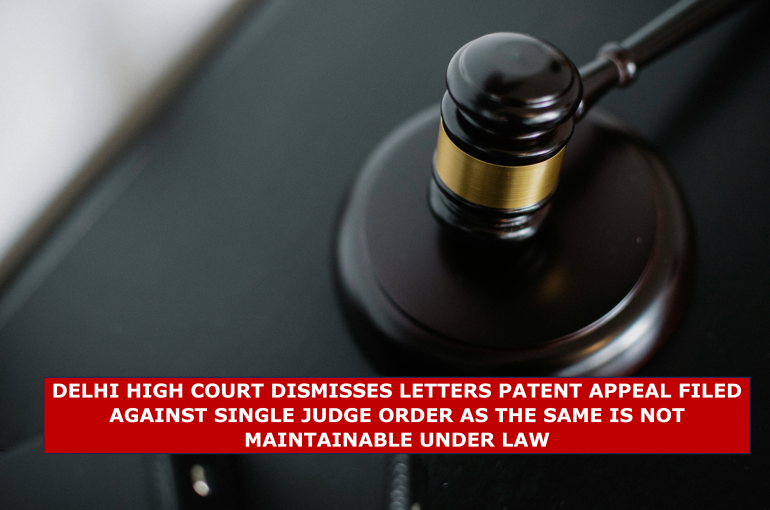DELHI HIGH COURT DISMISSES LETTERS PATENT APPEAL FILED AGAINST SINGLE JUDGE ORDER AS THE SAME IS NOT MAINTAINABLE UNDER LAW
A single Judge Bench of the Delhi High Court comprising of Acting Chief Justice of Delhi High Court Shri. Manmeet Pritam Singh Arora passed a judgment dated 02.04.2024 in the matter of Mahender Singh vs. the State & Ors., Letters Patent Appeal (LPA) 253/2024 and observed that the present Letters Patent Appeal filed against the judgment of the Single Judge of the High Court in the first Appeal is not maintainable on the ground that it would essentially be a Second Appeal, which is explicitly prohibited by Section 100A of the Code of Civil Procedure (CPC), 1908, as amended by Act 22 of 2002, which restricts further Appeals in certain cases.
FACTS:
i) That the Appeal above mentioned was filed before the High Court of Delhi by one, Mahender Singh (Appellant) against the State and Ors. (Respondents), that challenged the Impugned Judgment dated 05.02.2024, passed in First Appeal from Order (FAO) No. 523/2018, whereby the learned Single Judge of the High Court set aside the Order dated 26.04.2018 passed by the learned Additional District Judge, Saket Court, New Delhi (‘Trial Court’) in Probate Case No. 5972/2016.
ii) One Vijender Singh, (Respondent No. 2), had filed a Probate Case under Section 276 of the Indian Succession Act, 1925 (Petition for probate) seeking probate for a Will dated 04.04.2007, executed by Smt. Lado. The Trial Court dismissed this Probate Case, along with the objections raised by Mahender Singh, vide Order dated 26.04. 2018.
iii) Aggrieved by the Order dated 26.04 2018 of the Trial Court, Respondent No. 2 filed an Appeal in the High Court under Section 299 of the Indian Succession Act, 1925, (Appeals from orders of District Judge). The Single Judge of the High Court allowed the said Appeal, vide Order dated 05.02.2024, thereby setting aside the Trial Court’s Judgment.
iv) Aggrieved by the Order dated 05.02.2024 of the Single Judge Bench the Appellant filed an Appeal under Clause X of the Letters Patent of the High Court of Judicature at Lahore, which extends to the High Court of Delhi.
v) Subsequently, the High Court determined that the present Letters Patent Appeal is not maintainable. Further, the Bench concluded that this Appeal would be a Second Appeal, which is prohibited by Section 100A of CPC. The High Court referred to the Full Bench judgment in Avtar Narain Behal v. Subhash Chander Behal 2008 SCC Online Del 1154, wherein the Apex Court held that no Letters Patent Appeal is maintainable against the judgment of a Single Judge in a first Appeal arising from a special enactment like the Indian Succession Act, 1925.
vi) Furthermore, the Supreme Court’s judgment in Kamal Kumar Dutta v. Ruby General Hospital Ltd (2006) 7 SCC 613, supported this position. It clarified that Section 100A of CPC, which became effective from 01.07.2002, expressly took away the Letters Patent Appeal power of the High Court in such cases.
HIGH COURT OBSERVATION:
1) The High Court observed that the Letters Patent Appeal filed against the judgment of the Single Judge is not maintainable. The Court based its decision on Section 100A of CPC, which prohibits second appeals. Referring to the Full Bench judgment of the Supreme Court in Avtar Narain Behal v. Subhash Chander Behal (supra), the High Court herein emphasized that no Letters Patent Appeal is maintainable against a Single Judge’s judgment in a first Appeal arising from a special enactment like the Indian Succession Act, 1925.
2) The Court further clarified that Section 100A of the Code of Civil Procedure, introduced by Act 22 of 2002, explicitly bars further appeals against a Single Judge’s decree or Order. The legislative intent behind this provision was to reduce the backlog of cases and expedite the litigation process.
3) The Supreme Court’s judgment in Kamal Kumar Dutta v. Ruby General Hospital Ltd. (supra) was also cited, reinforcing that the power of the High Court to exercise Letters Patent in such matters was taken away after the enactment of Section 100A of CPC.
CONCLUSION:
Based on the aforementioned facts, the Hon’ble High Court held that the Letters Patent Appeal (LPA) was not maintainable under Section 100A of the Code of Civil Procedure, 1908. Further, while dismissing the LPA the Bench discussed and relied on the Judgment passed by the Supreme Court in the matter of Kamal Kumar Dutta and Another vs. Ruby General Hospital Ltd and Others (Supra) where the Apex Court held that since the enactment of Section 100-A CPC, that is effective from 01.07.2002, the High Court’s authority to use the Letters Patent power, in cases where a Single Judge has ruled on an appeal from the original order, has been explicitly removed. As a result, the High Court dismissed the Letters Patent Appeal filed by the Appellant.
Sakshi Raghuvanshi
Legal Associate
The Indian Lawyer





































Leave a Reply